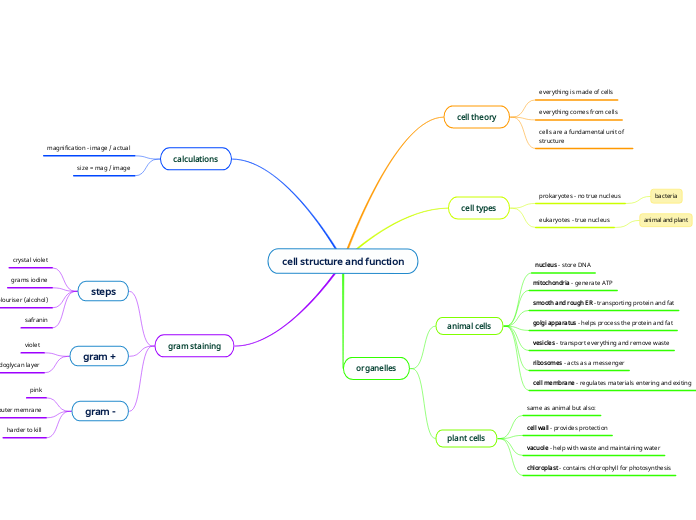cell structure and function
cell theory
everything is made of cells
everything comes from cells
cells are a fundamental unit of structure
cell types
prokaryotes - no true nucleus
bacteria
eukaryotes - true nucleus
animal and plant
organelles
animal cells
nucleus - store DNA
mitochondria - generate ATP
smooth and rough ER - transporting protein and fat
golgi apparatus - helps process the protein and fat
vesicles - transport everything and remove waste
ribosomes - acts as a messenger
cell membrane - regulates materials entering and exiting
plant cells
same as animal but also:
cell wall - provides protection
vacuole - help with waste and maintaining water
chloroplast - contains chlorophyll for photosynthesis
calculations
magnification - image / actual
size = mag / image
gram staining
steps
crystal violet
grams iodine
decolouriser (alcohol)
safranin
gram +
violet
thicker peptidoglycan layer
gram -
pink
extra outer memrane
harder to kill
specialized cells
palisade cells
adapted to absorb light more efficiently
fit tightly together
packed with chloroplast
face leaf's upper surface
white blood cells
phagocyte
engulfs pathogens and foreign particles
can move easily to sites of infection
lymphocytes
found in lymph nodes
produce antibodies
basophil
help detect and destroy cancer
fights germs
eosinophil
bi-lobed
combat particles
monocyte
largest
takes part in immunity
root hair cells
long root hair for extra surface area to absorb water
contain lots of mitochondria to release energy used for active transport
sperm cells
acrosome - releases enzymes to break membrane of egg
mitochondria - provides energy
centrioles - detaches head from tail
flagellum - helps with movement
red blood cells
biconcave shape
no nucleus
contains haemoglobin
egg cells
plasma membrane - provides protection
corona radiata - supplies protein
zona pellucida - prevents polyspermy
first polar body - unwanted chromosomes
tissue structure and function
endothelial tissue
lines veins and arteries
atherosclerosis
lining of the veins and arteries become thicker and harder
plaque
can cause a stroke
muscle tissue and fibres
skeletal
striated
multiple nuclei
mainly voluntary, makes you move
cardiac
1 nucleus per cell
striated
involuntary
smooth
not striated
1 nucleus per cell
lines blood vessels
involuntary
epithelial tissue
categorisation
simple, stratified, pseudostratified. transitional
squamous, cuboidal, columnar
found?
lining hollow organs
alveoli
pseudostratified columnar epithelium in lungs
simple squamous epithelium
gas exchange
COPD - airway become inflamed, cant get oxygen into tissue, can destroy alveoli
skin
keratinized stratified squamous epithelium
twitch muscle
nervous tissue
action potentials
an explosion of electrical activity
caused by a depolarising current
when a stimuli cause depolarisation past the threshold
depolarise (sodium+ in), repolarise (potassium+ out), hyperpolarise, resting potential
imbalances of chemicals
Parkinson's
caused by a lack of dopamine - body not able to communicate with the brain, causes you to shake
L-Dopa tablet treatment (pre-curser to dopamine), can pass the BBB, enzymes turn it into dopamine.
depression
caused by a decrease in production of serotonin
antidepressant medication makes the neurotransmitters more active for the production
neurons
myelinated
increased speed
insulated
non-myelinated
nerve impulse is slower
no myelin sheath
synapses
pre synaptic membrane
synaptic cleft - space between
post synaptic membrane
